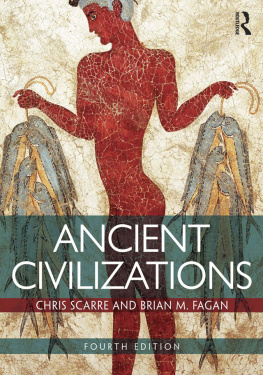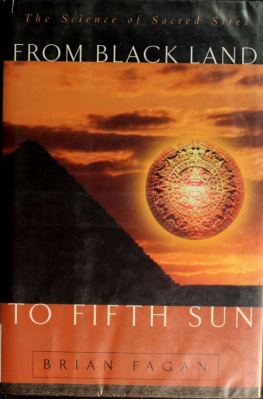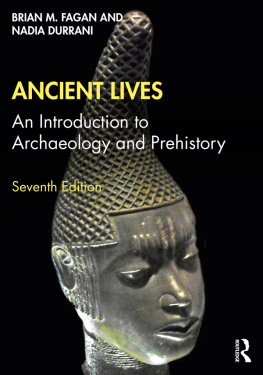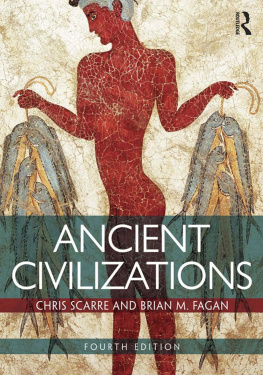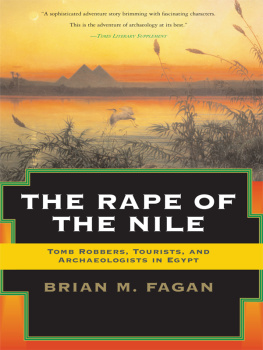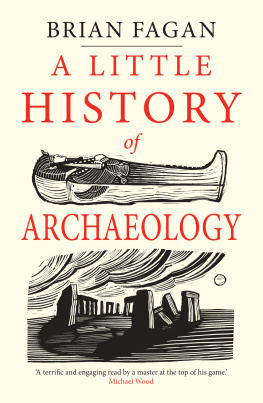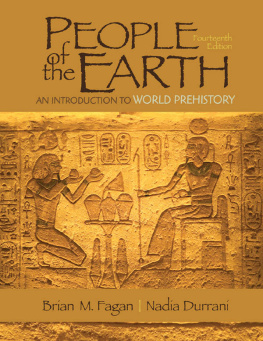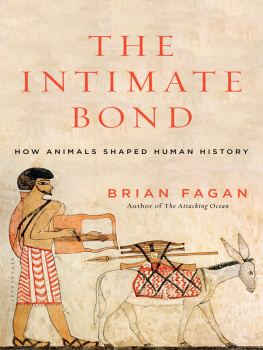Scarre Christopher.Fagan Brian M. - Ancient Civilizations
Here you can read online Scarre Christopher.Fagan Brian M. - Ancient Civilizations full text of the book (entire story) in english for free. Download pdf and epub, get meaning, cover and reviews about this ebook. City: London, year: 2016, publisher: Taylor & Francis Ltd, genre: History. Description of the work, (preface) as well as reviews are available. Best literature library LitArk.com created for fans of good reading and offers a wide selection of genres:
Romance novel
Science fiction
Adventure
Detective
Science
History
Home and family
Prose
Art
Politics
Computer
Non-fiction
Religion
Business
Children
Humor
Choose a favorite category and find really read worthwhile books. Enjoy immersion in the world of imagination, feel the emotions of the characters or learn something new for yourself, make an fascinating discovery.
- Book:Ancient Civilizations
- Author:
- Publisher:Taylor & Francis Ltd
- Genre:
- Year:2016
- City:London
- Rating:3 / 5
- Favourites:Add to favourites
- Your mark:
- 60
- 1
- 2
- 3
- 4
- 5
Ancient Civilizations: summary, description and annotation
We offer to read an annotation, description, summary or preface (depends on what the author of the book "Ancient Civilizations" wrote himself). If you haven't found the necessary information about the book — write in the comments, we will try to find it.
Ancient Civilizations — read online for free the complete book (whole text) full work
Below is the text of the book, divided by pages. System saving the place of the last page read, allows you to conveniently read the book "Ancient Civilizations" online for free, without having to search again every time where you left off. Put a bookmark, and you can go to the page where you finished reading at any time.
Font size:
Interval:
Bookmark:

Ancient Civilizations offers a comprehensive and straightforward account of the worlds first civilizations and how they were discovered, drawing on many avenues of inquiry including archaeological excavations, surveys, laboratory work, highly specialized scientific investigations, and both historical and ethnohistorical records. This book covers the earliest civilizations and the great powers in the Near East, moving on to the first Aegean civilizations, the Mediterranean world in the first millennium, Imperial Rome, northeast Africa, the divine kings in southeast Asia, and empires in East Asia, as well as early states in the Americas and Andean civilization.
Ancient Civilizations includes a number of features to support student learning: a wealth of images, including several new illustrations; feature boxes which expand on key sites, finds and written sources; and an extensive guide to further reading. With new perceptions of the origin and collapse of states, including a review of the issue of sustainability, this fourth edition has been extensively updated in the light of spectacular new discoveries and the latest theoretical advances.
Examining the worlds pre-industrial civilizations from a multidisciplinary perspective and offering a comparative analysis of the field which explores the connections between all civilizations around the world, Scarre and Fagan, both established authorities on world prehistory, provide a valuable introduction to pre-industrial civilizations in all their brilliant diversity.
Chris Scarre is an archaeologist specializing in the prehistory of Europe and the Mediterranean, with a particular interest in the archaeology of Atlantic faade. He has participated in fieldwork projects in Britain, France, Greece, and India, and has directed excavations at Neolithic sites in France, Portugal and the Channel Islands. Formerly Deputy Director of the McDonald Institute for Archaeological Research, University of Cambridge, he is now Professor of Archaeology at Durham University, UK, and editor of the leading international journal of archaeology Antiquity .
Brian Fagan is one of the worlds leading archaeological writers and an internationally recognized authority on world prehistory. He is Professor Emeritus of Anthropology at the University of California, Santa Barbara, where he specialized in writing and lecturing about archaeology to wide audiences. Professor Fagan has written several best-selling textbooks: Ancient Lives: An Introduction to Archaeology and Prehistory ; Archaeology: A Brief Introduction ; Archaeology and You ; In the Beginning: An Introduction to Archaeology ; A Brief History of Archaeology: Classical Times to the Twenty-First Century ; People of the Earth ; and World Prehistory: A Brief Introduction.
Fourth Edition
Chris Scarre Brian M. Fagan

Fourth edition published 2016
by Routledge
2 Park Square, Milton Park, Abingdon, Oxon OX14 4RN
and by Routledge
711 Third Avenue, New York, NY 10017
Routledge is an imprint of the Taylor & Francis Group, an informa business
2016 Chris Scarre and Brian M. Fagan (as the Lindbriar Foundation)
The right of Chris Scarre and Brian M. Fagan (as the Lindbriar Foundation) to be identified as authors of this work has been asserted by them in accordance with sections 77 and 78 of the Copyright, Designs and Patents Act 1988.
All rights reserved. No part of this book may be reprinted or reproduced or utilised in any form or by any electronic, mechanical, or other means, now known or hereafter invented, including photocopying and recording, or in any information storage or retrieval system, without permission in writing from the publishers.
Trademark notice: Product or corporate names may be trademarks or registered trademarks, and are used only for identification and explanation without intent to infringe.
First edition, second edition and third edition published by Pearson Education, Inc.
British Library Cataloguing in Publication Data
A catalogue record for this book is available from the British Library
Library of Congress Cataloging in Publication Data
Scarre, Christopher.
Ancient civilizations / Christopher Scarre, Brain M. Fagan. Fourth edition.
pages cm
Includes bibliographical references and index.
1. Civilizations, Ancient. I. Fagan, Brian M. II. Title.
CB311.S33 2016
930.1dc23
2015029584
ISBN: 978-1-138-18163-2 (pbk)
ISBN: 978-1-315-64679-4 (ebk)
Typeset in Bembo
by Apex CoVantage, LLC
| PART I Background |
| PART II The First Civilizations |
| PART III Great Powers in the Near East |
| PART IV The Mediterranean World |
| PART V Northeast Africa and Asia |
| PART VI Early States in the Americas |
Three thousand, four thousand years maybe, have passed and gone since human feet last trod the floor on which you stand, and yet, as you note the recent signs of life around youthe half-filled bowl of mortar for the door, the darkened lamp, the finger mark on the freshly painted surface, the farewell garland dropped on the threshold.... Time is annihilated by little intimate details such as these, and you feel an intruder.
Egyptologist Howard Carter, notebook entry on Tutankhamuns tomb, November 26, 1922.
Ancient civilizations tempt romantic visions of the past: golden pharaohs, great cities and temple mounds, lost palaces mantled in swirling mists. The discovery of the Assyrians, Homeric Troy, and the Maya civilization of Central America was one of the nineteenth centurys great adventure stories. Nineteenth-century archaeologists like Englishman Austen Henry Layard, who dug biblical Nineveh, and New Yorker John Lloyd Stephens, who revealed the ancient Maya to an astonished world, became celebrities and best-selling authors. They and other early excavators are the prototypes of the swashbuckling Indiana Jones of late-twentieth-century movie fame. The romance continued into the 1920s, culminating in Howard Carter and Lord Carnarvons dramatic discovery of the undisturbed tomb of the pharaoh Tutankhamun and Sir Leonard Woolleys spectacular excavation of the Royal Tombs at Ur in Iraq. Even today, the occasional spectacular find, like the terracotta regiment of the first Chinese emperor Qin Shihuangdi or the Lords of Sipn in coastal Peru, reminds us that archaeology can be a profoundly exciting endeavor.
The nineteenth century was the century of archaeological adventure. The twentieth century saw archaeology turn from a casual pursuit into a complex, highly specialized academic discipline. Ancient Civilizations describes what we know about the worlds early civilizations today, 175 years after John Lloyd Stephens and artist Frederick Catherwood stumbled through the ruins of Maya Copn and Paul-Emile Botta and Austen Henry Layard electrified London and Paris with spectacular bas-reliefs from Assyrian palaces. This book is about science and multidisciplinary research, not about adventure and romance, an attempt to summarize state-of-the-art knowledge about preindustrial civilizations in every corner of the world. We draw on many avenues of inquiry: on archaeological excavations, surveys, and laboratory work; on highly specialized scientific investigations into such topics as the sources of volcanic glass and metals; and on both historical and ethnohistorical records. In the final analysis, this book is a synthesis of science and ancient voices, for in many cases the latter add telling detail to a story reconstructed from purely material remains.
Font size:
Interval:
Bookmark:
Similar books «Ancient Civilizations»
Look at similar books to Ancient Civilizations. We have selected literature similar in name and meaning in the hope of providing readers with more options to find new, interesting, not yet read works.
Discussion, reviews of the book Ancient Civilizations and just readers' own opinions. Leave your comments, write what you think about the work, its meaning or the main characters. Specify what exactly you liked and what you didn't like, and why you think so.

